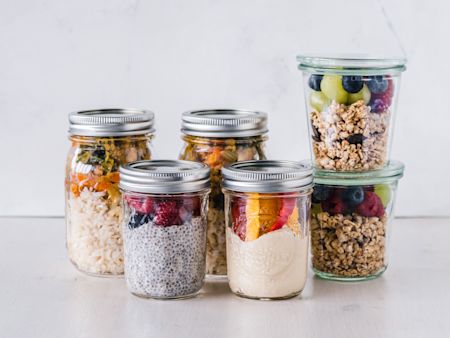Could Japan’s ‘interval walking’ method improve your health?
Are you up for trying this method of walking to stay fit?
Sign up for an annual subscription to The Body Coach app for just £69.99 (usually £89.99)

Even when we're super motivated and committed to hit our fitness goals, life can put things in the way that force us to stop and reassess. For many women, Polycystic Ovary Syndrome (PCOS) is one of those things.
Living with PCOS, one of the most common female hormonal disorders, raises a lot of questions around exercise and diet. But the good news, though, is that with the right approach to nutrition and fitness, PCOS doesn't have to be a barrier to getting lean and feeling awesome. Better still, the right food and fitness approach can help manage it.
In this blog freelance contributor, Kieran Alger, speaks to PCOS expert and author, Angelique Panagos, to bring you everything you need to know about PCOS when you're striving for your health and wellbeing goals.
PCOS is a complex condition that affects how your ovaries work. Although the exact cause is unknown, PCOS is related to abnormal hormone levels including resistance to insulin and raised levels of testosterone. It often runs in families and you'll usually start to notice symptoms in your late teens or early twenties.
Symptoms can include irregular or absent periods caused by an imbalance of hormones, difficulty in getting pregnant, excess facial and body hair, weight gain, thinning hair on your head and oily skin and acne.
Not everyone with PCOS will have all of the symptoms and they can vary in severity from person to person so, if you think you may have the syndrome, the first port of call should be your GP who can help you get a diagnosis.
While there's no cure for PCOS, the great news is that symptoms can be managed with the right lifestyle changes including exercise and a healthy diet and medication if needed.
"Simply put, PCOS is an insulin and testosterone-driven condition," says Angelique Panagos, a nutritional therapist specialising in PCOS and author of The Balance Plan: Six Steps to Optimise Your Hormonal Health. "It can lead to weight gain, especially around the stomach area, and insulin resistance, which in turn can result in other health problems such as type 2 diabetes. But if you're willing to make lifestyle changes around how you eat, sleep and move then you can balance your blood sugar, increase your sensitivity to insulin and manage your symptoms, including your weight, effectively."
It means that as well as all the usual benefits of regular exercise, you're going to see improvements in your PCOS symptoms too. Insulin resistance can cause you to carry extra weight but the NHS says that if you have a high BMI, reducing your body weight by just 5% can mean significant improvements to your symptoms.
This means exercise and moving more should be part of your general lifestyle along with a healthy diet. Recent studies show that strength training can help with insulin resistance and adding a few sessions to your weekly routine could mean that you not only burn fat and change your body shape but also manage some of the symptoms of PCOS too. One study in Brazil found that women with PCOS who followed a progressive strength training programme saw a significant decrease in testosterone levels - higher levels of testosterone are responsible for symptoms such as acne, hirsutism and thinning hair.
HIIT training is great too and research shows that short, sharp bursts of exercise can have a positive affect on your sensitivity to insulin. Even better, these affects can last for up to three days after the session.

While all this may leave you wanting to workout for hours at a time, Angelique has a word of warning. "Too much exercise can have the opposite effect," she says. "Overtraining leads to increased levels of cortisol - the stress hormone - and stress can increase your chances of insulin resistance. Balance is key."
As well as HIIT and strength training, Angelique advises adding some stress-busting activities, such as walking and yoga, to your routine.
"Definitely," says Angelique. "It's really important to eat a healthy balanced diet if you have PCOS as eating sugary and refined carbohydrate foods can cause your blood sugar to spike creating elevated peaks of insulin. With your blood sugar you should be aiming for molehills rather than significant peaks and troughs."
This means steering away from insulin spiking items such as processed foods and high sugar treats and replacing them with a balanced diet including plenty of good fats from olive oil, avocados and oily fish, complex carbohydrates such as brown rice, wholewheat pasta and sweet potatoes, and protein like chicken, eggs, nuts and seeds. All the stuff that you want to have on your lean shopping list.
"A great breakfast could be something like eggs with tomato, spinach and avocado, or porridge with nuts and seeds or some nut butter stirred through" says Angelique. "For lunch or dinner you could have chicken with sweet potato and leafy greens, a quinoa salad with beans and spinach, a bun-less burger with salad or a homemade curry with brown rice. I always make double the amount at dinner time so I have healthy leftovers for lunch or to put in the freezer."
Angelique recommends eating plenty of vegetables as the fibre will leave you feeling fuller for longer and reduce cravings for sugary foods. She also suggests eating foods rich in vitamin D such as eggs, mushrooms, sardines, tuna and salmon.
And her top tip? "Cinnamon is my PCOS superhero. It helps you become more sensitive to insulin, reduces cravings and you don't need much to see effects. Try adding a teaspoon to your morning porridge."
If you think you may have PCOS or are unsure how to manage the symptoms, your first port of call should always be your GP.
Written by freelance contributor, Kieran Alger.